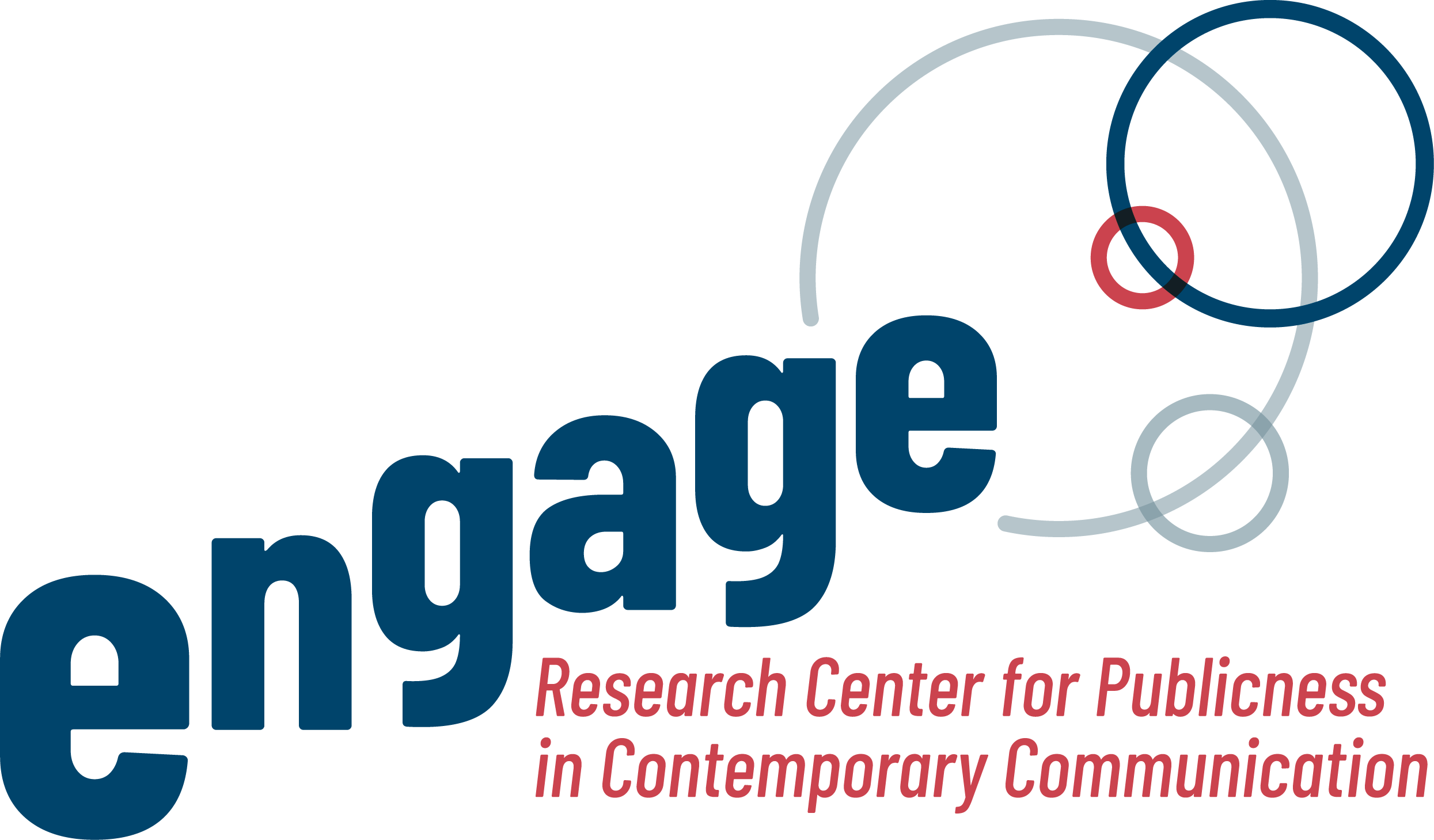Nos recherches
La communication stratégique des institutions dans l’espace public
The strategic communication of institutions in the public sphere
Every waking hour of our lives, various institutional actors are communicating their interests to us. Corporations want our business, NGOs want our solidarity, political parties want our vote, governments want our confidence,… For these institutional actors, the public sphere functions as an arena where they engage in strategic attempts to advance their cause. In doing so, they constitute, reproduce, and transform this public sphere, their own identities, as well as those of their interlocutors. Engage’s scholars study the discursive and communicative dimensions of these never-ending processes of contestation, normalization, politicization, persuasion, influence, and propaganda.
The rhetorical and discursive foundations of political strategy
Harnessing the temporality of the COVID-19 health crisis in discourse. A critical discourse study of the evolution of the uses of time in the political and scientific discourse in the decision-making process [Doctoral Thesis]
La participation politique et institutionnelle
Political and institutional participation
In the age of social media, digital networks, and platform capitalism, the modalities of how citizens participate in democracy and society are rapidly changing. Based on the assumption that participation is always a negotiation of power relations, Engage sets out to investigate how citizens’ media and digital practices can foster or forestall citizen involvement in decision-making processes in different societal fields and institutions. This axis also questions the way in which participation can change how citizens relate to institutions, for example in terms of trust or legitimacy. Engage is particularly interested in citizen participation in public policy-making, at different institutional levels (e.g. European, national, local), and in different thematic contexts (e.g. climate change, European Citizens’ Initiatives (ECI), constitutional reforms).
La (dé)politisation de l’écocitoyenneté en Belgique : analyse ethnographique multisituée des discours et des pratiques des jeunes activistes, et des participants et participantes au dispositif de participation institué pour les jeunes en Belgique [Thèse de doctorat].
COST Action CA17135 Constitution-making and deliberative democracy (ConstDelib)
Strengthening Brussels’ media clusters: Organisations, workers and communities of practice at Pôle Reyers and beyond [project completed]
La participation dans un monde de communication [projet terminé]
La participation composite. Extensions et déclinaisons de la participation citoyenne vues au travers des pratiques de l’Initiative Citoyenne Européenne [thèse de doctorat terminée]
Débats et critiques dans/de l’espace public
Debates and critiques in/of the public sphere
The defining characteristic of public debates and critiques in democratic societies is that they are riddled with faultlines and antagonisms. Controversy and contestation have become fundamental and integral parts of the public sphere. Of course, being a constant societal turmoil has rendered the public sphere itself into an object of controversy in its own right. As such, Engage does not only seek to understand the processes through which the public debate is constituted, in doing so it also wants to examine how the hosting of a constant and intense public debate affects the architecture and the functioning of the public sphere on a meta-level. In analyzing public debates and critiques, Engage positions itself firmly within the public sphere, so that it can actively participate in it as a conscious and critical social actor.
Economic nationalism (EN) as an ideology in EU politics: a discourse-theoretical approach [post-doctoral project funded by F.R.S.-FNRS, ended]
Discours critiques des ex-musulmans sur les islam/ismes. Analyse de la rhétorique construite sur X (Twitter) : représentations, argumentations et répertoire idéologique [thèse de doctorat]
La critique publique que s’adressent les journalistes et les politiques lors de polémiques. Dimensions métadiscursives et articulations de la démocratie en France, en Suisse francophone, au Québec et en Belgique francophone [thèse de doctorat terminée]
Metapolitics and metapolitical discourse
Towards heuristic guidelines for transdisciplinary discourse studies
L’usage des médias et la littératie médiatique au prisme de la citoyenneté démocratique
Media use and media literacy through the prism of democratic citizenship
Overarching societal processes such as the rise of populism, the disinformation and conspiracy epidemic, and the decline of traditional socio-political infrastructures cannot be divorced from the way in which citizens experience, handle, and reify these processes on a day-to-day basis. Hence, this line of research focuses on how the use of media and digital platforms in everyday life expresses, constitutes and/or transforms the democratic experience of citizens and their orientation towards the public sphere. The goal of Engage is to elucidate the ways in which so-called ‘ordinary’ uses of media and digital platforms – that is, usage that is not ‘expert’, ‘militant’, ‘organized’ or ‘institutional’ in nature – contribute to the construction of a sense and experience of citizenship and publicness. This line of research connects in particular to “user”, “audience” and “reception” studies, as well as to the studies on information/media/digital literacy as a condition for exercising citizenship and engaging in the public sphere.
